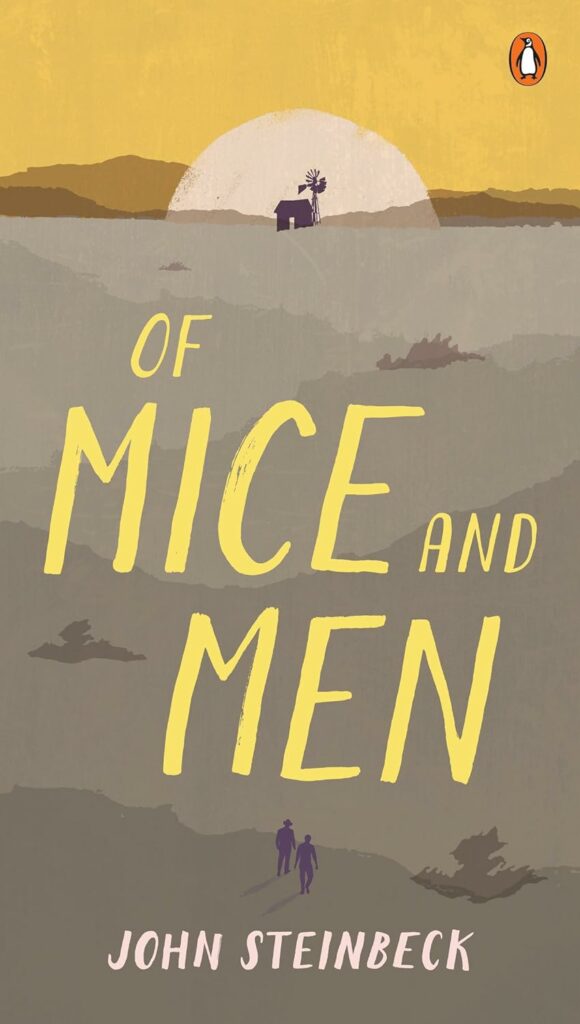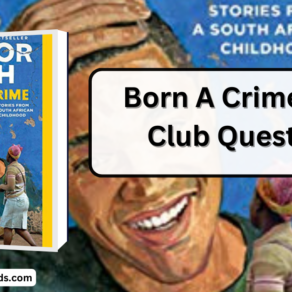Welcome to our exploration of John Steinbeck’s classic, “Of Mice and Men.” This timeless novel, set during the Great Depression, tells the poignant story of George and Lennie, two itinerant workers chasing the elusive American Dream amidst challenging social and economic conditions. Steinbeck’s work is renowned for its exploration of themes like friendship, dreams, and the harsh realities of life.
In this post, we’ll delve into various aspects of the novel to enrich your understanding and appreciation of this literary masterpiece. We start with an extended summary, offering a comprehensive overview of the plot, key themes, and the historical context. This summary will give you a solid foundation for understanding the depth and nuances of Steinbeck’s narrative.
Following the summary, we’ll present a selection of impactful quotes from the novel. These quotes are not just excerpts; they encapsulate the essence of Steinbeck’s poignant storytelling and the novel’s enduring themes. They serve as powerful reflections on the human condition and the societal challenges of the era.
We’ll also introduce you to the characters of “Of Mice and Men.” Each character in Steinbeck’s narrative is meticulously crafted, contributing to the story’s exploration of loneliness, aspirations, and societal roles during the 1930s. Understanding these characters is key to grasping the full impact of the novel.
Lastly, for those who love to engage in deeper analysis and discussion, we’ve prepared a set of book club questions. These questions are designed to provoke thought and discussion, encouraging you to consider the novel’s themes, character dynamics, and its relevance both in its historical setting and in today’s world.
Whether you’re reading “Of Mice and Men” for the first time or revisiting it, this post aims to provide a comprehensive and enriching journey through one of Steinbeck’s most celebrated works. Let’s dive in and explore the depths of this enduring novel.
Related: This Tender Land Summary, Characters, and Book Club Questions
Of Mice and Men Summary
“Of Mice and Men,” a novel by John Steinbeck, set during the Great Depression, is a poignant tale of friendship, dreams, and the harsh realities of life. The story centers around two itinerant workers, George Milton and Lennie Small, who are as different as can be, yet bound together by a shared dream and a deep mutual affection.
George is small, intelligent, and quick-witted, while Lennie is a giant of a man but with the mind of a child. Despite his physical strength, Lennie is gentle and often unaware of his own power. The two have been traveling together for a long time, working as laborers in California’s agricultural fields, living a nomadic, hand-to-mouth existence.
The core of the novel is the dream that George and Lennie share – to own a piece of land, live off “the fatta the lan’,” and enjoy a self-sustaining life. This dream represents not just a longing for economic independence, but also a desire for freedom, security, and belonging, in a world that seems increasingly hostile and unpredictable.
Their journey leads them to a ranch in the Salinas Valley, where they find work. The ranch is populated by a cast of characters who reflect various aspects of human nature and the societal norms of the time. There’s Candy, an aging, disabled swamper who fears his impending uselessness; Curley, the boss’s aggressive son; Slim, the wise and respected mule driver; and Curley’s wife, a lonely, misunderstood woman who dreams of a better life.
As the story unfolds, Steinbeck skillfully explores themes such as the nature of dreams, the inequalities inherent in society, and the cruel reality of unfulfilled aspirations. The novel is as much a reflection on the human condition as it is a commentary on the specific social and economic conditions of the Depression era.
Tragedy strikes when Lennie’s interactions with Curley’s wife result in unintended but devastating consequences. Lennie’s inability to control his strength and understand the complexities of his actions leads to a tragic climax, forcing George to make a heart-wrenching decision. In the end, the fragility of the dream is laid bare, and the reader is left to ponder the profound themes of loneliness, hope, and the often-unreachable American Dream.
“Of Mice and Men” is a narrative that questions the very essence of human connection, the pursuit of happiness, and the inevitable realities that confront our deepest desires. Steinbeck’s writing is concise yet powerful, with a narrative that is as compelling as it is tragic. It’s a book that not only depicts the struggles of its time but also resonates with universal themes that are just as relevant today.
Of Mice and Men Quotes
Here are some popular quotes from Of Mice and Men:
“Maybe everybody in the whole damn world is scared of each other.” ― John Steinbeck, Of Mice and Men
“I got you to look after me, and you got me to look after you, and that’s why.” ― John Steinbeck, Of Mice and Men
“His ear heard more than what was said to him, and his slow speech had overtones not of thought, but of understanding beyond thought.” ― John Steinbeck, Of Mice and Men
“As happens sometimes, a moment settled and hovered and remained for much more than a moment. And sound stopped and movement stopped for much, much more than a moment.” ― John Steinbeck, Of Mice and Men
“Guy don’t need no sense to be a nice fella. Seems to me sometimes it just works the other way around. Take a real smart guy and he ain’t hardly ever a nice fella.” ― John Steinbeck, Of Mice and Men
“Just like heaven. Everybody wants a little piece of land I read plenty of books out here. Nobody never gets to heaven, and nobody gets no land. It’s just in their head. They’re all the time talking about it, but it’s just in their head.” ― John Steinbeck, Of Mice and Men
“A guy needs somebody―to be near him. A guy goes nuts if he ain’t got nobody. Don’t make no difference who the guy is, long’s he’s with you. I tell ya, I tell ya a guy gets too lonely and he gets sick.” ― John Steinbeck, Of Mice and Men
“Ain’t many guys travel around together,” he mused. “I don’t know why. Maybe everybody in the whole damn world is scared of each other.” ― John Steinbeck, Of Mice and Men
“Well, I never seen one guy take so much trouble for another guy. I just like to know what your interest is.” ― John Steinbeck, Of Mice and Men
“Try to understand men, if you understand each other you will be kind to each other. Knowing a man well never leads to hate and nearly always leads to love.” ― John Steinbeck, Of Mice and Men
“As happens sometimes, a moment settled and hovered and remained for much more than a moment.” ― John Steinbeck, Of Mice and Men
Of Mice and Men Characters
“Of Mice and Men” by John Steinbeck features a range of characters that contribute to its exploration of friendship, dreams, and the harsh realities of life during the Great Depression. Here are the key characters:
- George Milton: A small, wiry, and intelligent man, George is the more pragmatic of the two main characters. He cares deeply for Lennie, despite his occasional frustration with him. George dreams of owning his own piece of land and living a life of freedom.
- Lennie Small: A physically large man with the mind of a child, Lennie is characterized by his innocence and physical strength, which often leads to unintentional trouble. His love for soft things and lack of understanding of his own strength play a pivotal role in the story.
- Candy: An aging ranch handyman, Candy loses his hand in an accident and worries about his future on the ranch. He clings to the dream of joining George and Lennie in owning a piece of land.
- Curley: The boss’s son, Curley is aggressive, confrontational, and insecure, particularly about his small stature. His aggressive nature and jealousy play significant roles in the novel.
- Curley’s Wife: The only significant female character in the story, she is never named and is unhappy in her marriage. She is often portrayed as flirtatious and is desperate for attention and companionship.
- Slim: A highly skilled mule driver and the acknowledged “prince” of the ranch. Slim is respected by all the ranch workers and is the character others turn to for advice. He represents a figure of rationality and wisdom in the novel.
- Carlson: A ranch hand, Carlson is insensitive and pragmatic. He is the one who suggests shooting Candy’s old dog, representing a harsh and unsentimental approach to life.
- Crooks: The black stable-hand, Crooks is isolated from the others because of his race. His character highlights the themes of loneliness and the effects of racial discrimination.
- The Boss: The owner of the ranch, he is a fair man but remains a distant figure.
Of Mice and Men Book Club Questions
Here are some thought-provoking questions to guide your discussion:
- Character Analysis: How do George and Lennie’s personalities complement each other? What does their relationship say about the nature of friendship, especially during hard times like the Great Depression?
- The American Dream: Steinbeck explores the American Dream through George and Lennie’s aspirations. Do you think this dream is portrayed as attainable or illusory in the novel? How does the ending of the book influence your view?
- Symbolism: Consider the role of animals in the story, such as Lennie’s puppy and Candy’s dog. What do they symbolize, and how do they contribute to the novel’s themes?
- Themes of Loneliness and Isolation: Each character in the book seems to grapple with loneliness in some form. Discuss how Steinbeck portrays loneliness and isolation. Which character’s experience resonated with you the most?
- The Role of Women: The only significant female character is Curley’s wife, who is not even given a name. What does this suggest about the role and perception of women during this time period? How does her character affect the events in the story?
- Social and Racial Inequality: Examine the character of Crooks, the black stable-hand. How does his experience reflect the racial attitudes of the 1930s? Discuss the intersection of race and social hierarchy as presented in the novel.
- Moral and Ethical Dilemmas: The ending of the novel presents a significant moral dilemma for George. Discuss the decision he makes and whether you agree or disagree with it. What would you have done in his situation?
- Steinbeck’s Writing Style: How does Steinbeck’s writing style contribute to the impact of the novel? Consider elements like description, dialogue, and pacing.
- Historical Context: How does the novel reflect the historical context of the Great Depression? Discuss how the economic conditions of the time influence the characters’ lives and decisions.
- Modern Relevance: Despite being published in 1937, in what ways is “Of Mice and Men” still relevant today? Are there any themes or issues in the book that you see reflected in contemporary society?
Related: Before We Were Yours Summary
Final thoughts
In conclusion, “Of Mice and Men” by John Steinbeck remains a profound and enduring work of literature, capturing the complexities of human relationships and the relentless pursuit of dreams in the face of daunting obstacles. Through the extended summary, carefully chosen quotes, a detailed look at the characters, and thought-provoking book club questions, we’ve explored the many layers of this poignant narrative.
As educators, readers, or simply as individuals navigating our own complex lives, “Of Mice and Men” invites us to reflect on the nature of our relationships, societal norms, and personal aspirations. Steinbeck’s masterful storytelling and the novel’s enduring relevance remind us of the power of literature to transcend time and place, offering both a mirror to our own lives and a window into the lives of others.







